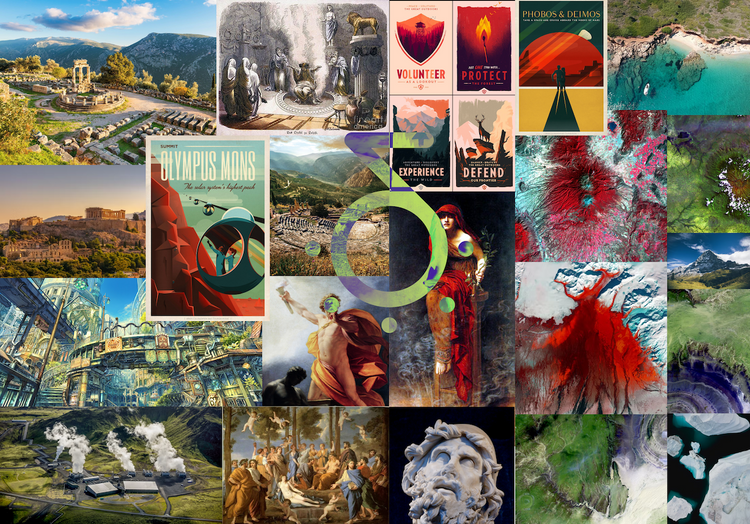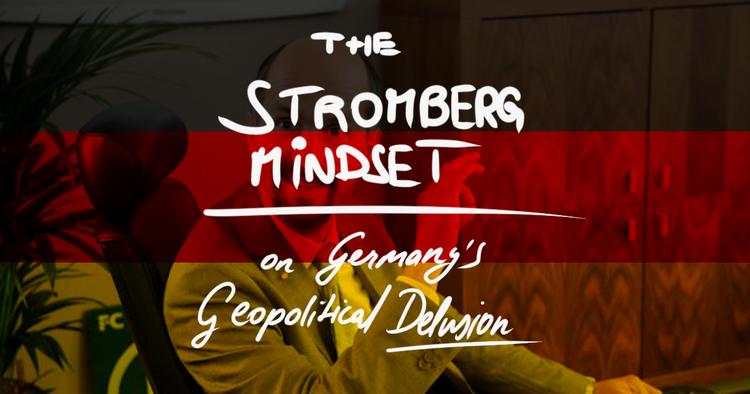Twelve Projects: Ukraine, Energy Systems, and Carbon Removal (Update 4.1)
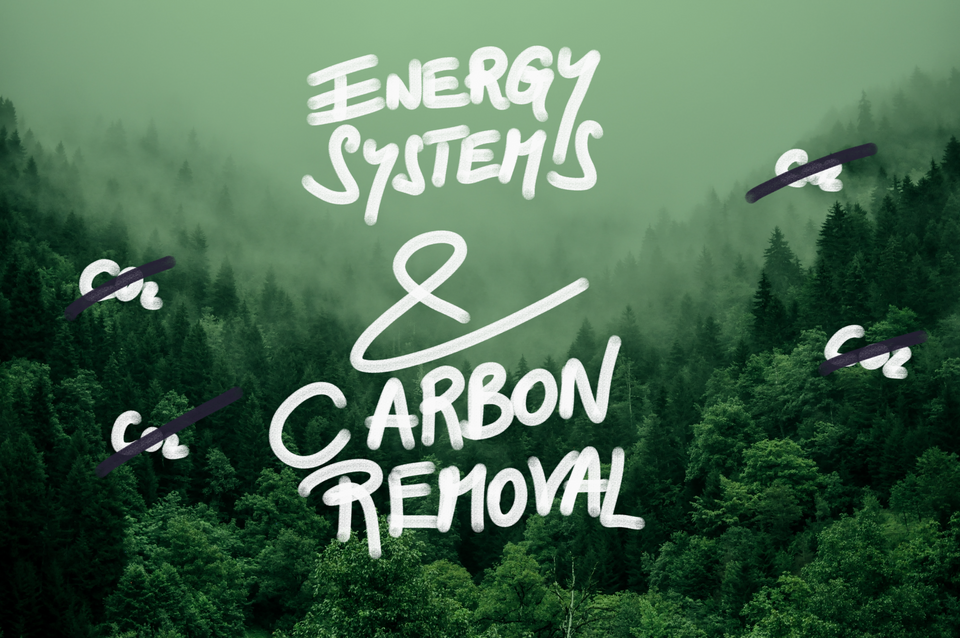
Oh man, oh man... what a year.
How are YOU doing?
This is not a hypothetical question... If you are reading this, I would love to know.
Are you good? What's on your mind? Can I help?
Please drop me a line 🙏
April Update
For this post, I want to return to the old format where I write a bit about "12 projects in 12 months".
Today I'll discuss:
- 🇺🇦 Ukraine-related updates
- 🔋 How I'm learning Energy Systems this month (+ my learning & note-taking method in Notion)
- 🌳 Accelerating carbon removal with Advanced Market Commitments (AMCs)
- 🔥 A writing project, that might get me in trouble
This is a longer update. Feel free to skip ahead if there are certain areas, which are more interesting 🙌
Updates from Month 2 of the Ukraine War 🇺🇦
→ We are hosting a Ukrainian family in our apartment until the end of the summer
→ I donated $1,000.00 directly to a Ukrainian family on the ground via 1kproject.org
→ ukraina.guide moves over to maintenance mode
→ I frequently hear that "people are overwhelmed with the situation" ... I'll share a (hopefully constructive) opinion further below
Hosting Someone
We are hosting the family of a Ukrainian friend (4 people) in our primary apartment in Berlin.
In the meantime, we adjusted our travel schedule so that we either (a) stay with friends/family, or (b) spend time in our apartment in Athens.
The decision was relatively easy to take for a couple of reasons:
- ⏰ Timing: During the early days of the war we had a trip booked to Athens and decided to host someone for two weeks while we were gone.
- 🤝 Personal Connection: A friend's family arrived in Berlin literally the day we left for Greece. That made it super easy to commit. Two weeks became four weeks and now it will be ~ 4 months.
- 🗓 Schedule: Our schedule from March through July included a couple of pre-planned trips out of Berlin (weddings; meeting friends; business trips; holiday visits of family; etc.) so that we only had to figure out "where to go" for a couple more weeks.
- 💻 Infrastructure: We are both lucky to be able to work wherever there is internet... and the internet in Athens is faster than the one in Berlin 🙄
- 💶 Finances: Our rent is less than €900 and us staying in the other places is free of charge. My girlfriend and I unanimously agreed to continue paying the rent ourselves. We felt that "we could afford it" and that "it is the least we can do to help the family in this situation".
The specifics of our arrangement might not be 100% transferrable but I wanted to share them for transparency reasons.
If you are in the position to host someone and are interested, you can have a look at the country-specific resources on Ukraina Guide or check Airbnb.org which does a good job at matching hosts with guests.
Donating $1k
One day I saw this tweet:
I backed it, so should you. https://t.co/FftHJYqSfM
— Philipp Moehring (@pmoe) March 12, 2022
The idea of the 1kproject is simple: Transfer $1,000.00 directly to the bank account of a Ukrainian family in need. No middlemen. No BS.
To me, this felt more tangible than donating to the Ukrainian Armed Forces - which is also a legit way to support.
The transfer works via Wise and the organization sends you a follow-up report from the family.
I tried it and can recommend it 👍
Ukraina Guide
Ukraina Guide is live and keeps hosting helpful resources for refugees of the Ukraine War.
Here we have the analytics data in case you want to play around with it:
The building phase is complete and now we're moving into maintenance mode.
- Simplified Immigration: The European Temporary Protection Directive is live and takes care of all visa considerations for residents of Ukraine (incl. Ukrainian and non-Ukrainian citizens). This means I don't have to research regional visa regulations.
- Emigration Peak: UNHCR estimates that around ~4,500,000 people have left Ukraine already. I've heard that the Ukrainian border now registers more inflows than outflows. People seem to be returning to the Western parts of Ukraine. My assumption is that interest in my resource has peaked.
- Solid-state Info: Lucky enough, there are amazing resources, that I could embed directly into the website without needing to update it myself. One example is this Google Map, which has updated info on all Western border crossings in Ukraine 👇
"It's so overwhelming. I don't know where to start."
I agree.
Every single person I talked over the past weeks has mentioned that they feel helpless. I did too.
But the reality is: The world has many problems.
Wars are going on not only in Ukraine but in many different countries. There are refugees who have been running from other conflicts. There might be injustices closer to your home.
If you are interested in helping, then see if there's a problem that you have a strong connection to and figure out how your specific set of skills might be helpful. Having a strong motivation helps.
I'm helping in the Ukraine context because of my family history and my interest in the safety of the European Union. I felt a deep purpose and decided to go for it.
Maybe you are helping with Ukraine or maybe you have other issues, which resonate deeply with you. And that is fine.
We will need many different people tackling many different problems if we want to build a good future for us all 🌍
Makes sense?
My Learning Journey: Exploring Energy Systems 🔋
During my last update in March, I wrote:
A massive red flag during the past two weeks was Germany's energy dependency on Russian oil/gas and how it seemingly impacted policy decisions.
I want to understand the high-level picture and then drill down into the details:
Basics (what is energy)
Energy Demand (who/what/how much)
Energy Supply (who/what/how much)
Delta (which levers we can adjust to play with supply/demand)
Infrastructure (extraction; transportation; storage; utilization)
Value Chain (who are the players)
Legal (constraints; requirements)
Policy (how does all of the above depend on and inform policy)
Most likely I will write a couple of posts about this to understand it myself.
Step #1: Systems Thinking
Systems Thinking is the science of understanding complexity. It helps to have a basic understanding of it when looking at Energy Systems and geopolitics.
I took a Coursera course called "Systems Thinking in Public Health". It's rather quick to complete and gets the basics across (intro + causal loop diagrams + stock and flow diagrams).
I summarized my learnings in an "Introduction to Systems Thinking" and a follow up post, which ties Systems Thinking to the current geopolitical context 👇
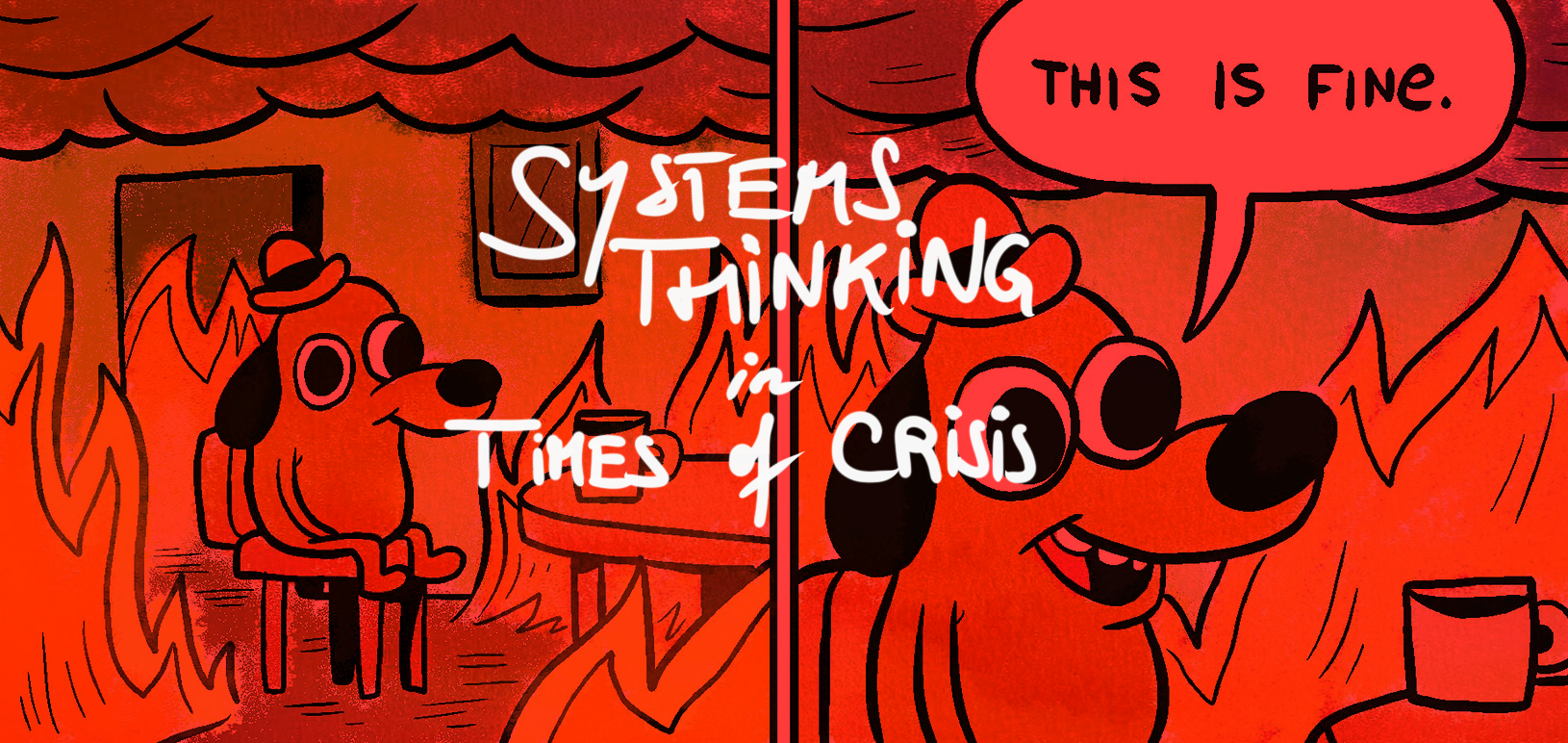
Step #2: Intro into Energy Systems
I started taking another Coursera course called "Politics and Economics of International Energy".
I'm blown away how good the course is.
- 🇪🇺 European Context: A lot of the material is translated into the European energy security context, since the course is taught by the French school Sciences Po
- 💪 Kick-ass Syllabus: From intro to global energy trends (energy transition; energy poverty; decarbonization) to in-depth seminars about all different energy sources (coal; oil; gas; nuclear; renewables).
- 🏛 Private vs. Public Sector: The course does a good job of contrasting the different perspectives in the energy system. Bottom-up (industry) vs. Top-down (government).
In the coming weeks I'll write summary posts of the most useful concepts to understand how the Energy System works.
My Learning and Note-Taking Method 📝
Nowadays I learn differently than when I was in undergrad.
2 cool ideas I learned in the past years were:
- 🔭 Focus on Big Ideas → Instead of sweating the details, I just look at trends and big picture learnings.
- 📇 Progressive Summarization → Edit, change, expand, and reduce your summaries with every review cycle. That way you interact with the material from different angles.
Here is a link to my notes from week #1 of the energy systems course so you can see yourself 👇

Taking notes in Notion is great because I can create and relate databases and most importantly all my headlines are automatically summarized in the table of contents.
That way I see a summary of the entire page at the very top. This helps me to review the big ideas every time I open a note.
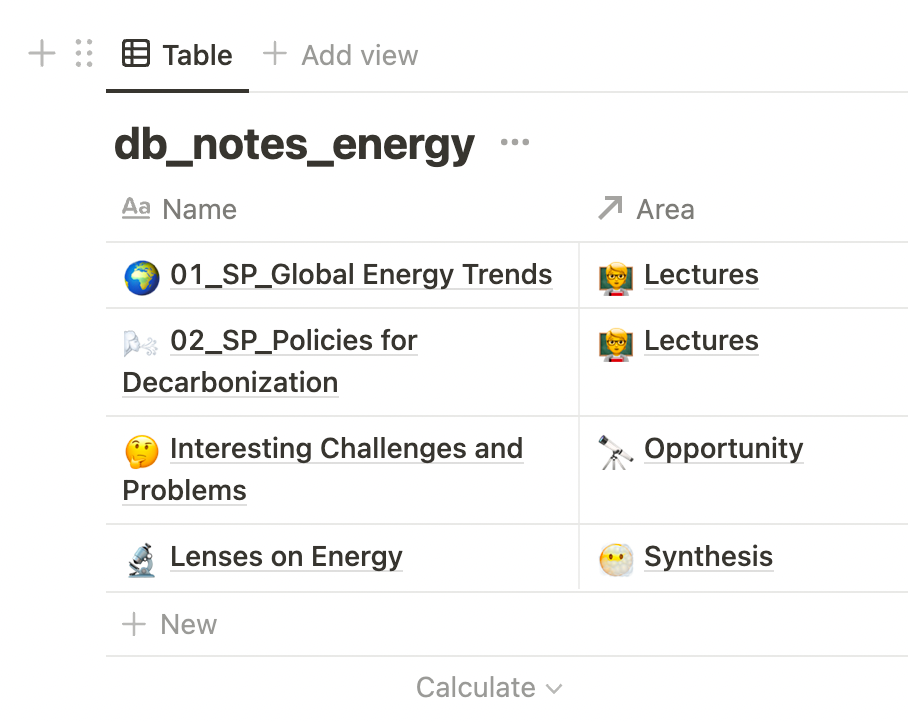
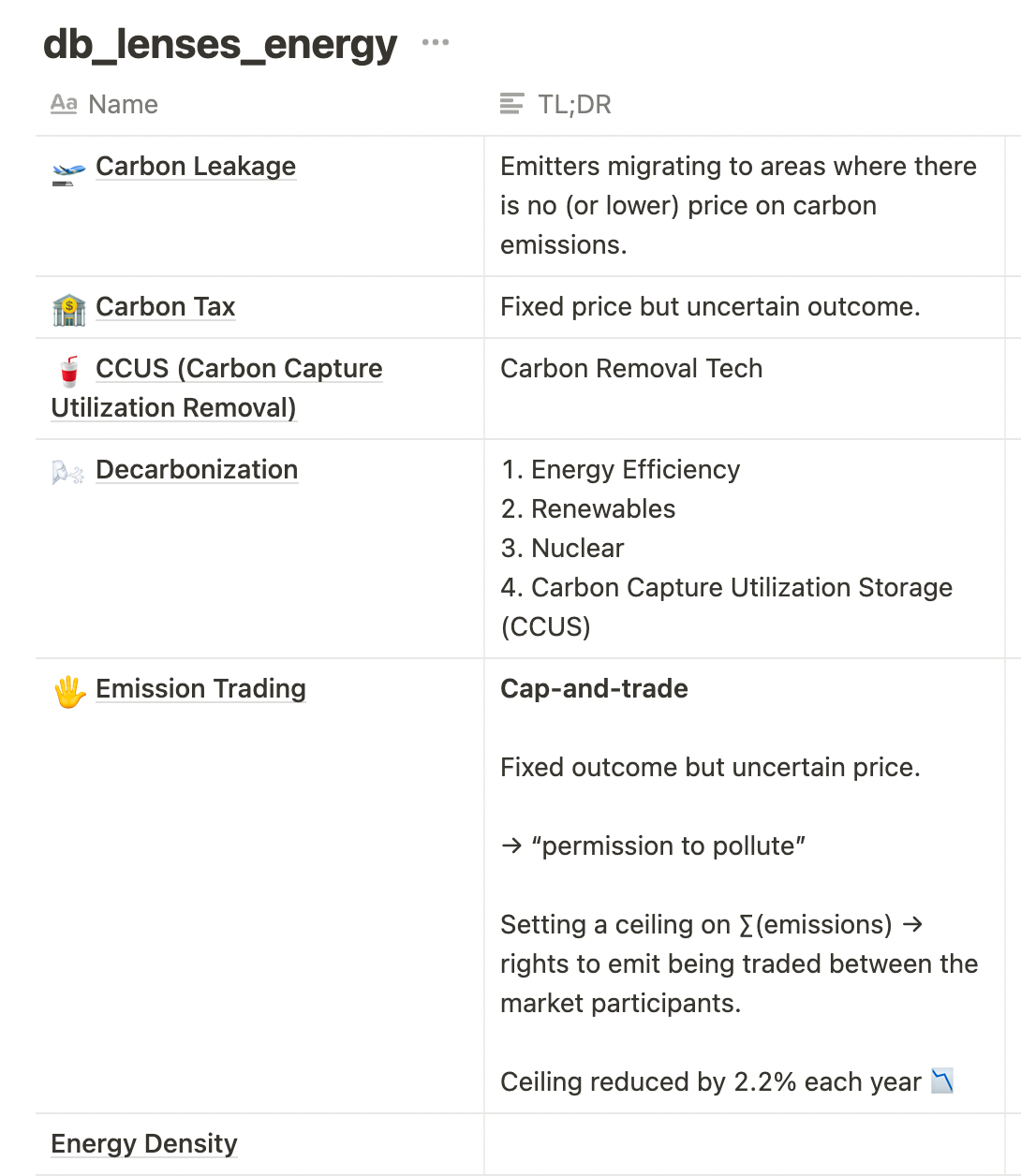
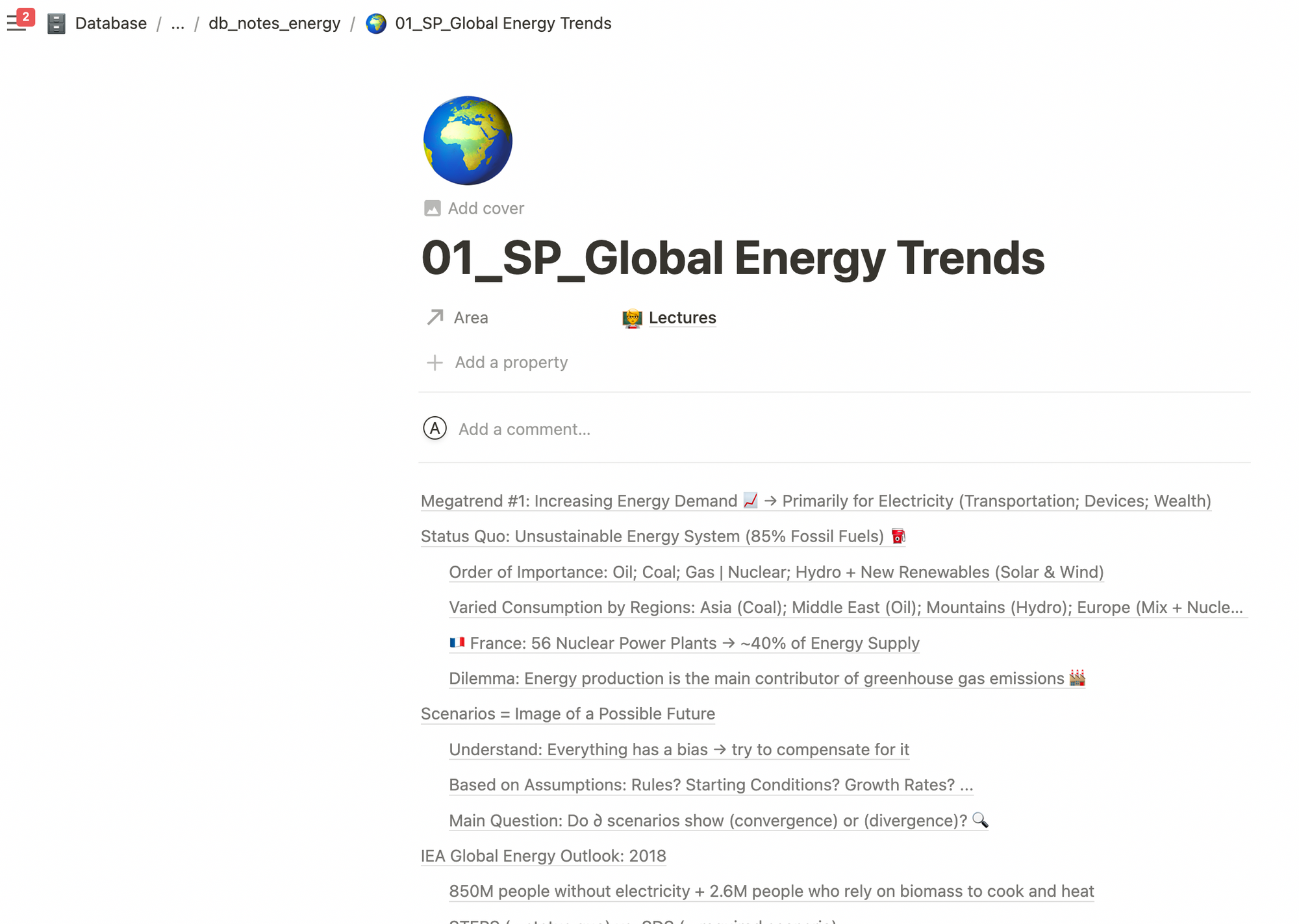
Please let me know if this method is of interest and I can create a quick video walk through of how I use Notion for learning.
What the Hell Are AMCs and Why Are They Such a Big Deal? 🌳
As part of my energy systems research I'm following a bunch of people on Twitter. Researchers, entrepreneurs, policymakers.
Yesterday, my Twitter feed was full of messages like this one 👇
Today, I’m excited to launch Frontier—an advance market commitment (AMC) that will buy $925M+ of permanent carbon removal by 2030. Build and we will buy: https://t.co/NsuifxU4Ro. 🛠️ https://t.co/rNtEVf3jxp
— Nan Ransohoff (@nanransohoff) April 12, 2022
So what is Frontier Climate and why does it matter?
The Problem: CO2
Let's start with the problem: We have too much CO2 in the atmosphere 🌬
I'll try to explain in a couple of sentences:
- We are emitting more and more CO2 → CO2 is one of the main contributors to global warming and climate change
- There are different ideas how to tackle climate change but one thing is certain: we must remove existing CO2 from the atmosphere... if we don't do it, we're royally fucked
- There are different ways of removing CO2 from the atmosphere → the umbrella term for such solutions is CCUS (Carbon Capture, Utilization and Storage)
The Complication: No Demand
The complication: There is no market for CCUS solutions yet. 🤷♂️
- There are companies who are working on interesting CCUS concepts but most of those have early prototypes or low-volume productions
- In order to have a real impact on CO2 removal, these companies need to scale up (more carbon removal facilities; more spend on research & development; etc.)
- The problem is that there are currently no buyers for these solutions
- No buyers means no up-front investment into research & development
This is a typical chicken & egg problem.
Without buyers you cannot scale CCUS solutions. Without scalable CCUS solutions there will be no buyers.
The Solution: Frontier Climate
The solution: An advance market commitment of $1BN for carbon removal 💸
Advance market commitments were used at the beginning of the COVID pandemic to guarantee demand for vaccine developers. That's how we ended up with effective COVID vaccines in record time.
A group of companies re-applied this concept to carbon removal.
Frontier is an advance market commitment to buy an initial US$925M of permanent carbon removal between 2022 and 2030. It’s funded by Stripe, Alphabet, Shopify, Meta, McKinsey, and tens of thousands of businesses using Stripe Climate.
To put the $925,000,000.00 advance market commitment into perspective: It is twenty times more money than what has been historically spent on carbon removal.
Think about this for a second 🤯
It's like saying: Space travel is still expensive. Up until 2022 only 1,000 people have gone to space. Our solution is to guarantee and pre-buy 20,000 seats from space flight companies ot accelerate progress and drive the price down.
Sometimes it does help to throw money at a problem.

I love the idea and I'm looking forward where else we'll see advance market commitments next 🤔
The Stromberg Principle 🔥
I'm working on a project at the intersection of the Ukraine War, geopolitics, and European Energy security.
Finished a draft about Germany's role in the current EU Russian oil embargo fiasco.
— Art 🇺🇦 | Researching 🔋x 🇪🇺 x 🛡 (@artlapinsch) April 11, 2022
It's an extension of @vgr 'Gervais Principle' and @alex_danco 'Michael Scott Theory of Social Class'
Anyone wants to proof-read? Editors will be credited.
If so, give me a shout 👋 pic.twitter.com/e3c6hAdvW7
My main problem is Germany's current policymaking.
Slow. Poor. Clueless.
That's why I decided to put my criticism into an article and hopefully trigger some reaction in the German policy bubble.
So far I have received amazing feedback from Katharina, Michael, Mo, Chris, Rika, JG, and a few others. I hope to push this over the line in the coming days.
Challenges I have:
- 🥊 Impact: I'm trying to pack the most punch in this article → still working at simplifying the idea and getting rid of all the redundant ideas
- 🚀 Distribution: My friend Mo recommended that reach out to the German journo bubble to help with distribution. If you have any ideas or connections, please help :)
Give me a shout, if you are interested in geopolitics and want to proof-read.
Thanks for being along for the ride! I really appreciate it 🙏
As always, if you have any type of feedback/critique/ideas/etc., let me know.
Peace, Art ✌️







